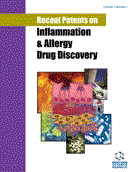Abstract
Background: Nonsteroidal anti-inflammatory drugs (NSAIDs) are used to treat the pathological pain and inflammation through inhibition of cyclooxygenase (COX) enzyme and disruption of the synthesis of prostaglandins (PGs). The α-L-guluronic acid (G2013) patented (PCT/EP2017/067920), as a novel NSAID with the immunomodulatory property, has been shown its positive effects in experimental models of multiple sclerosis and anti-aging.
Objective: This study was aimed to investigate the effects of G2013 on the gene expression and activity of COX-1/COX-2 enzymes in order to introduce a novel NSAID for the treatment of inflammatory diseases.
Method: The mRNA expression levels of COX-1/COX-2 were measured by qRT-PCR. The PGE2 concentration in culture media was determined using ELISA method.
Results: Our results demonstrated that the low and high dose of G2013 could significantly reduce the gene expression of COX-1 and COX-2, as compared to the control treated with LPS (p < 0.05). In addition, data showed that 5, 50 and 500 mMol/ml doses of this drug can significantly the reduce activities of COX-1 and COX-2, as compared to the control treated with LPS and AA (p < 0.0001).
Conclusion: This study revealed that G2013, as a novel NSAID with the immunomodulatory property, is able to reduce the gene expression and activity of COX-1/COX-2 enzymes. According to the findings, this agent might be categorized and introduced as a novel NSAID for the treatment of inflammatory diseases.
Keywords: COX-1, COX-2, G2013, guluronic acid, immunomodulation, NSAIDs, PGE2.
 50
50 7
7


















